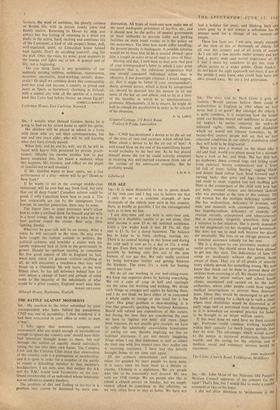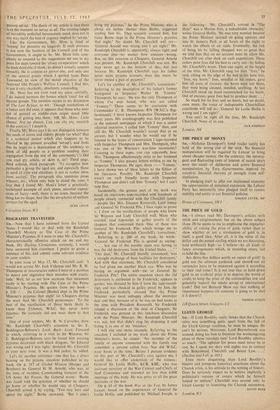SH2,—Mr. John Moss of the National Old People's Welfare Council
approves of my concern for the aged? That's fine, but I would like to make a candid comment or two on his letter.
I did not draw attention to 'weaknesses in the.
present set-up.' The thesis of my article is that there is at the moment no set-up at all. The existing tangle of incredibly potholed bureaucratic muck does not in any way merit the hint of cogency implied by 'set-up.' Like the Government, Mr. Moss is fond of 'hoping' for pressure on laggards. If such pressure is not now the business of his Council and of the Government, it ought to be. Mr. Moss fails com- pletely to respond to the suggestions set out in my piece for steps toward the 'closer co-operation' which he finds desirable (I think; he doesn't actually commit himself): He is content to parrot one, and only one of the several points which I quoted from Peter Townsend. In view of the stated objective of the National Old People's. Welfare Council, 1 find this, to put it very charitably, absolutely astounding.
Mr. Moss has not even read my piece carefully. I do indeed mention the homes 'which 'exist' for all income groups. The mention occurs in my discussion of The Last Refuge, to wit: 'Though institutions of a better sort did exist, it appears that those who were not of genteel or middle-class origin stood little chance of getting into them.' NB, Mr. Moss: Little chance. Not no chance. Can you cite any research to the contrary? I doubt it.
Finally Mr. Moss says I do not distinguish between the needs of active and elderly people (so what? that is a technical matter. which also happens to be blurred in the present so-called 'set-up'), and from • this he leaps to a deprecation of 'the tendency to , think of old people as a problem needing their segregation from the rest of the community'(!) Did you read my article, or skim it, sir? Third page, third column, third paragraph: 'To recognise how particular a group the aged arc, and especially those in need of care and attention, is not to isolate thent front society.' The paragraph also mentions pious wheezes, etc., which only help to cloud the issue. ' I fear that I found . Mr. Moss's letter a practically archetypal example of such pious, miasmal expres- sions, of fuzzy—well, there is no noun, because the thing has no shape. Just like the'un-scheme of welfare services for the aged.



































 Previous page
Previous page